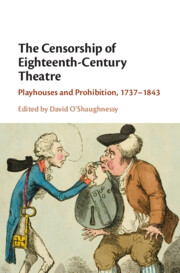Book contents
- The Censorship of Eighteenth-Century Theatre
- The Censorship of Eighteenth-Century Theatre
- Copyright page
- Dedication
- Contents
- Figures
- Contributors
- Acknowledgements
- Abbreviations
- Introduction
- Part I Gender
- Part II Politics
- Part III Performance
- Chapter 7 The Censorship of Personal Satire on the Eighteenth-Century Stage
- Chapter 8 Censoring the Unseen
- Chapter 9 Evading Censorship through Comedy, Improvisation, and Non-verbal Performance in the Early Nineteenth Century
- Chapter 10 Censoring Regency Flash
- Bibliography
- Index
Chapter 7 - The Censorship of Personal Satire on the Eighteenth-Century Stage
from Part III - Performance
Published online by Cambridge University Press: 03 August 2023
- The Censorship of Eighteenth-Century Theatre
- The Censorship of Eighteenth-Century Theatre
- Copyright page
- Dedication
- Contents
- Figures
- Contributors
- Acknowledgements
- Abbreviations
- Introduction
- Part I Gender
- Part II Politics
- Part III Performance
- Chapter 7 The Censorship of Personal Satire on the Eighteenth-Century Stage
- Chapter 8 Censoring the Unseen
- Chapter 9 Evading Censorship through Comedy, Improvisation, and Non-verbal Performance in the Early Nineteenth Century
- Chapter 10 Censoring Regency Flash
- Bibliography
- Index
Summary
The Stage Licensing Act of 1737 took aim chiefly at contemporary political satire and ad hominem satirical impersonations. But mimicry posed obvious challenges to a censorship system built upon pre-performance review of play texts because the impersonation is manifested in performance, not in the play script. Personal satire in the form of impersonation deserves more scrutiny than it has received because far from prohibiting mimicry on the eighteenth-century stage, the Licensing Act allowed it to flourish. If anything, it seems to have become more prevalent on the British stage after the law was passed than before. How did the law create conditions that increased the incident and impact of mimicry? When was the government spurred to take action against impersonation on the stage? And why did the government generally choose not to take any action regarding mimicry? The answers to these questions lie neither in the words of the law itself nor in the documentary record represented by the Larpent Collection. Looking at performance records and other sources, this essay examines the career of Tate Wilkinson to provide new insights into the relationship between impersonation and censorship.
- Type
- Chapter
- Information
- The Censorship of Eighteenth-Century TheatrePlayhouses and Prohibition, 1737–1843, pp. 155 - 173Publisher: Cambridge University PressPrint publication year: 2023



